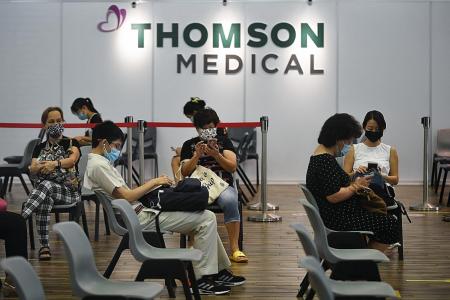Singapore to review its Covid-19 restrictions early next month
Some measures will be eased if clusters under control, hospitalisation rates low
Singapore will review its Covid-19 restrictions early next month, easing some measures if virus clusters are under control and hospitalisation rates remain low.
But only vaccinated people will be allowed to take advantage of these looser restrictions, as they are "much better protected against the effects of the virus", said Finance Minister Lawrence Wong yesterday.
A larger proportion of vaccinated people who have contracted the virus but display mild or no symptoms will also be admitted directly to community care facilities instead of first going to hospitals. This is part of Singapore's move towards treating the virus as endemic, Health Minister Ong Ye Kung said.
His ministry also plans to allow more people to serve their quarantine at home. In addition, it is reviewing its policies so that fully vaccinated patients - who are already discharged from isolation seven days earlier than other patients - can be discharged even earlier and complete the rest of their isolation at home.
The two ministers, along with Trade and Industry Minister Gan Kim Yong, were giving Parliament an overview of the next steps in the country's pandemic response.
A total of 4.24 million people have received at least one dose of a vaccine, with 3.07 million having completed the full two-dose regimen, as at Sunday.
By early next month, about two-thirds of Singapore would have received both doses, Mr Wong said. Three-quarters of all seniors aged 70 and above would also be vaccinated by then.
At that time, the authorities will assess the overall infection situation. They will also monitor the status of infected cases to confirm that vaccines have weakened the link between infection and hospitalisation.
If all goes well, rules on social gatherings will be eased for vaccinated individuals, the minister said.
"This means that if you want to attend a large event or a religious service involving more than 100 persons, you have to be fully vaccinated," he told the House in a ministerial statement. "If you want to go out to dine in a restaurant or work out in a gym, you have to be fully vaccinated."
Further down the road, fully vaccinated travellers may see stay-home notices replaced by a rigorous testing regimen, or may just serve a shorter notice at home, instead of in a hotel, Mr Wong said.
Mr Ong said it is now clear that those who are fully vaccinated are less likely to become critically ill when they contract the virus. "(The protocols) need to shift closer to how we treat influenza today, without extensive contact tracing and quarantine in dedicated facilities, and hospitalising only those who are very ill," he said.
On the economic front, Mr Gan stressed that businesses should prepare for Covid-19 to become endemic.
This means helping eligible employees get vaccinated and integrating the use of antigen rapid tests into work processes, as well as continuing flexible work arrangements, he said.
FOR MORE, READ THE STRAITS TIMES
Get The New Paper on your phone with the free TNP app. Download from the Apple App Store or Google Play Store now



